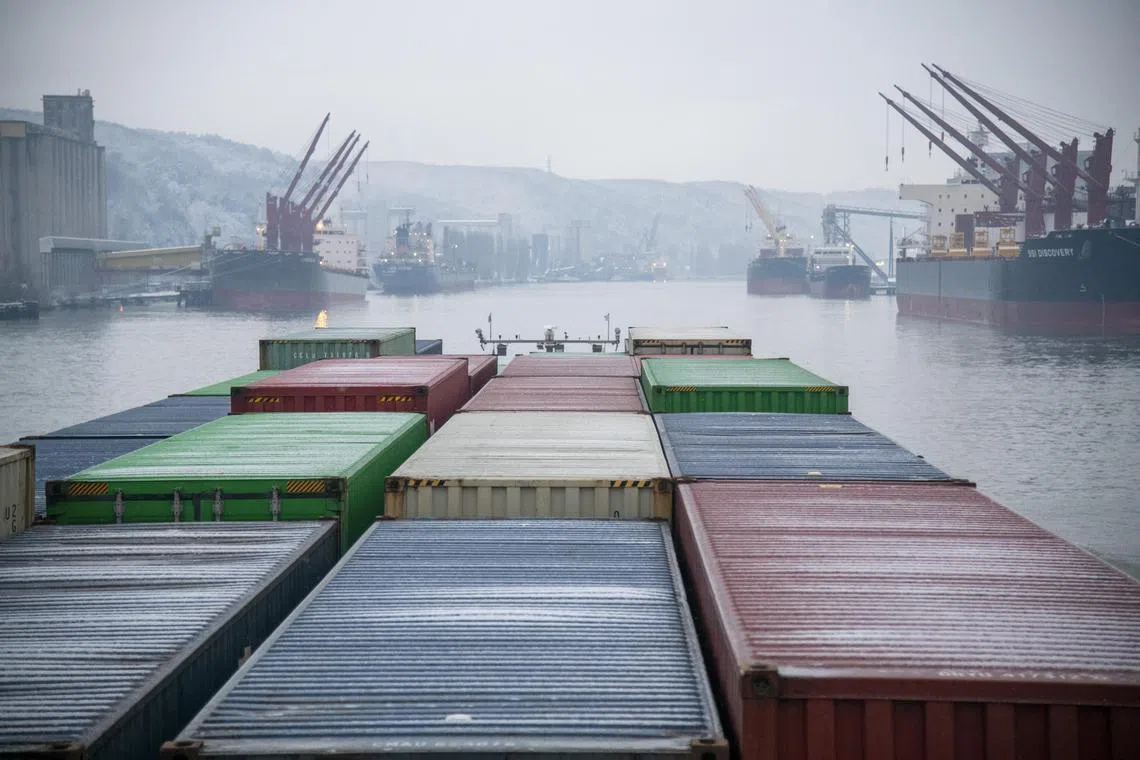Europe has fallen behind US and China. Can it catch up?
Sign up now: Get ST's newsletters delivered to your inbox

For more than a decade, Europe has been falling behind on several measures of competitiveness.
PHOTO: NYTIMES
LONDON – Europe’s share of the global economy is shrinking, and fears are deepening that the continent can no longer keep up with the US and China.
“We are too small,” said former Italian prime minister Enrico Letta, who recently delivered a report on the future of the single market to the European Union.
“We are not very ambitious,” Mr Nicolai Tangen, head of Norway’s sovereign wealth fund, the world’s largest, told the Financial Times. “Americans just work harder.”
“European businesses need to regain self-confidence,” Europe’s association of chambers of commerce declared.
The list of reasons for what has been called the “competitiveness crisis” goes on: The EU has too many regulations, and its leadership in Brussels has too little power. Financial markets are too fragmented; public and private investments are too low; firms are too small to compete on a global scale.
“Our organisation, decision-making and financing are designed for ‘the world of yesterday’ – pre-Covid, pre-Ukraine, pre-conflagration in the Middle East, pre-return of great power rivalry,” said Mr Mario Draghi, another former Italian premier and a former president of the European Central Bank (ECB) who is heading a study of Europe’s competitiveness.
Cheap energy from Russia, cheap exports from China and a bedrock reliance on military protection by the US can no longer be taken for granted.
At the same time, Beijing and Washington are funnelling hundreds of billions of dollars into expanding their own semiconductor, alternative energy and electric-car industries, and upending the world’s free trade regime.
Private investment lags as well. Large corporations, for example, invested 60 per cent less in 2022 than their US counterparts, and grew at two-thirds the pace, according to a report by the McKinsey Global Institute. As for per-capita income, it is on average 27 per cent lower than in the US. And productivity growth is slower than in other major economies, while energy prices are much higher.
Mr Draghi’s report will not be released until after voters across the EU’s 27 states go to the polls this week to elect their parliamentary representatives.
But he has already declared that “radical change” is necessary. In his view, that means an enormous increase in joint spending, an overhaul of Europe’s higgledy-piggledy financing and regulations, and a consolidation of smaller firms.
The built-in challenges of getting more than two dozen countries to act as a single unit have sharpened in the face of rapid technological advancement, growing international conflicts and the increased use of national policies to steer business. Imagine if every state in the US had national sovereignty and there were only limited federal power to raise money to fund things like the military.
Europe has already taken some steps to keep up. Last year, the EU passed a Green Deal Industrial Plan to speed the energy transition, and this spring it proposed for the first time an industrial defence policy. But these efforts have been dwarfed by the resources that the US and China are employing.
The bloc “is set to fall far behind its ambitious energy transition targets for renewable energy, clean technology capacity and domestic supply chain investments”, research firm Rystad Energy said in an analysis this week.
In Mr Draghi’s view, public and private investment in the EU needs to rise by an additional €500 billion (S$733 billion) a year on the digital and green transitions alone to keep pace.
Both his report and Mr Letta’s were ordered by the European Commission, the executive body of the EU, to help guide policymakers when they meet in the autumn to draw up the bloc’s next five-year strategic plan.
There is still a sizeable contingent in Europe – and elsewhere – that prefers open markets and is suspicious of government interventions. But many of Europe’s top officials, political mandarins and business leaders are increasingly talking about the need for more aggressive collective action.
Without pooling public financing and creating a single capital market, they argue, Europe will not be able to make the kind of investments in defence, energy, supercomputing and more that are required to compete effectively.
Mr Letta said he experienced first hand Europe’s peculiar competitive deficiencies when he spent six months visiting 65 European cities to research his report. It was impossible to travel “by high-speed train between European capitals”, he said. “This is a profound contradiction, emblematic of the problems of the single market.”
The proposed solutions, though, can rub against the political grain. Many leaders and voters across the continent are profoundly concerned about jobs, living standards and purchasing power. But they are wary of giving the EU more control and financial muscle. And they are often reluctant to watch national brands merge with rivals or familiar business practices and administrative rules disappear. Creating a new morass of red tape is another worry.
For more than a decade, Europe has been falling behind on several measures of competitiveness, including capital investments, research and development, and productivity growth. But it is a world leader in reducing emissions, limiting income inequality and expanding social mobility, according to McKinsey.
And some of the economic disparities with the US are a result of choice. Half the gap in per-capita gross domestic product between Europe and the US is a result of Europeans opting to work fewer hours, on average, over a lifetime.
Such choices may be a luxury Europeans no longer have if they want to maintain their standards of living, others warn. Policies governing energy, markets and banking are too disparate, said Mr Simone Tagliapietra, a senior fellow at Bruegel, a research organisation in Brussels. “If we continue to have 27 markets that are not well integrated,” he said, “we cannot be competing with the Chinese or the Americans.” NYTIMES


